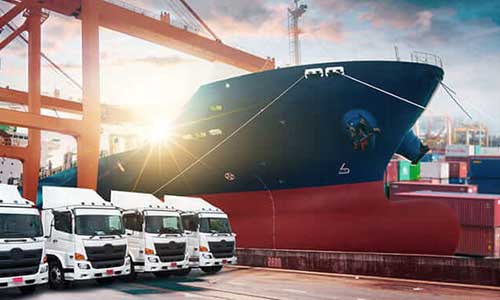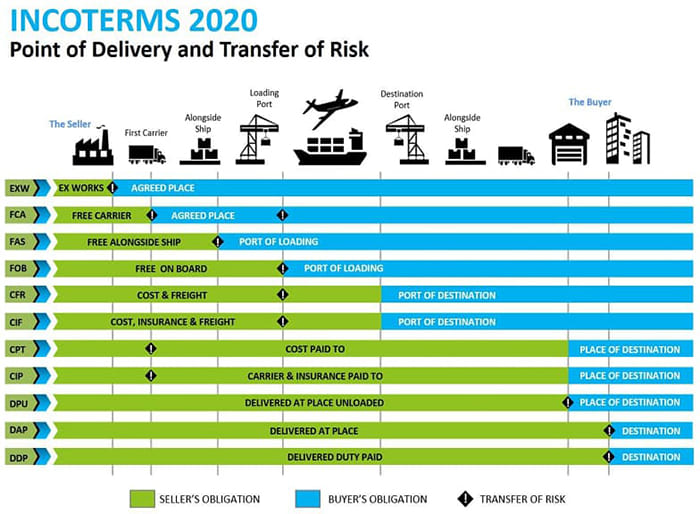Incoterms differentiate transaction costs and liabilities between buyers and sellers and reflect the most advanced shipping practices.
Incoterms deal with issues related to the delivery of products from the seller to the buyer. This includes issues such as product shipment, import, and export customs clearance responsibilities, who pays what, and who is at risk to the product’ condition at different locations during transit.

Common shipping terms
FOB (Free On Board)
FOB means the seller needs to pay for local fee and send the cargo to the designated place by the buyer. Risk transfers from seller to buyer once the goods are loaded on the plane. And the Buyer needs to pay for all freight costs.
FCA (Free Carrier)
FCA means that the buyer assumes all costs and risks. The seller delivers the cargo to the freight forwarder nominated by the buyer at the designated place, and goes through the export customs clearance procedures, that is, to complete the delivery.
EXW (Ex Works)
EXW means the buyer assumes all the costs and risks. Delivery is complete when the seller sends the cargo to the buyer at its location or other designated location (such as a workshop, factory, or warehouse) at the disposal of the buyer.
The seller transport the cargo to designated in the importing country and pay all the cost during the transportation, excluding customs duties and other charges payable upon import.
DDP (Delivered Duty Paid)
DDP means that the seller transports the goods to the place designated by the buyer, is responsible for customs clearance, and bears all costs and risks in the transportation process. Including customs duties and handling fees.
FAS (Free Alongside Ship)
FAS means that the seller is responsible for delivering the goods to the side of the ship designated by the buyer at the port. The risk and expense are borne by the buyer.
CNF (Cost and Freight)
CNF means that the seller must pay for the cost and freight required to deliver the goods to the agreed destination port.
CIF (Cost, Insurance, and Freight)
Delivery is completed after the seller has transported the goods to the ship designated by the carrier.
The seller must pay the freight and charges required to deliver the goods to the named port of destination, but the risk of loss of or damage to the goods after delivery and any additional costs due to various events pass from the seller to the buyer. However, under CIF conditions, the seller must also take out marine insurance against the buyer’s risk of loss or damage to the goods in transit.
Shipping terms chart can help you learn the means of incoterm clearly.

The advantages of using incoterms
International trade activities through Incoterms can reduce the cost of communication between traders of different cultures, simplify the negotiation process in the trade negotiation stage, and shorten the time of the trade.
Since Incoterms can help both parties in international trade to fully and accurately understand their respective responsibilities and obligations, while reducing the probability of trade disputes, it should also try to avoid unnecessary troubles caused by contract disputes.
Airsupply is familiar with all incoterms and shipping rules. We provide the competitive price of air, sea, and rail freight, with no hidden fee. And we have rich experience in dealing with dangerous cargo and sensitive goods.
We also have exclusive charter service from China to European and North America. If you want to ship cargo from China, click the button below, and we will reply to you within 30 minutes.




